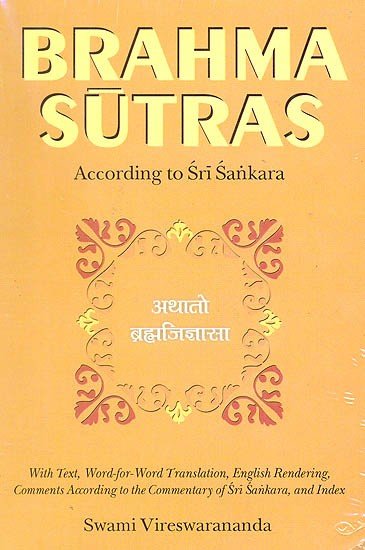Brahma Sutras (Shankara Bhashya)
by Swami Vireshwarananda | 1936 | 124,571 words | ISBN-10: 8175050063
This is the English translation of the Brahma-sutras including the commentary (Bhashya) of Shankara. The Brahma-sutra (or, Vedanta-sutra) is one of the three canonical texts of the Vedanta school of Hindu philosophy and represents an early exposition the Vedantic interpretation of the Upanishads. This edition has the original Sanskrit text, the r...
Chapter II, Section III, Adhikarana VI
Adhikarana summary: Earth Created From Water
Brahma-Sutra 2.3.12: Sanskrit text and English translation.
पृथिवि, अधिकाररूपशब्दान्तरेभ्यः ॥ १२ ॥
pṛthivī, adhikārarūpaśabdāntarebhyaḥ || 12 ||
pṛthivī—Earth; adhikāra-rūpa-śabdāntarebhyaḥ—because of the subject-matter, colour, and other Sruti texts.
12. Earth (is meant by the word ‘Anna’) because of the subject-matter, colour, and other Sruti texts.
“From water earth” (Taitt. 2. 1); “It (water) produced Anna (lit. food)” (Chh. 6. 2. 4). The two texts are apparently contradictory; for in one water is said to produce earth and in another food. The Sutra says that ‘Anna’ in the Chhandogya text means not food, but earth. Why? First on account of the subject-matter treated in the section. In “It created fire,” and such other texts the Sruti describes the creation of the five elements, and so ‘Anna’ should refer to an element and not food. Again in a complementary passage we have, “The black colour in fire is the colour of Anna” (Chh. 6. 4. 1), where the reference to colour clearly indicates that the earth is meant by ‘Anna’. Hence ‘Anna’ in the passage under discussion means earth, and there is no contradiction between the Chhandogya and Taittiriya texts. Other Sruti texts like, “That which was there as the froth on water was solidified and became this earth” (Brih. 1. 2. 2), clearly show that from water earth is produced.
